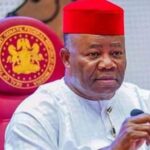
Nigeria’s total public debt has risen to N152.40 trillion as of June 30, 2025, marking an increase from N149.39 trillion recorded at the end of March, according to new data released by the Debt Management Office (DMO).
The figure represents a quarterly rise of N3.01 trillion, or 2.01 percent, while in dollar terms, the debt stock climbed from $97.24 billion to $99.66 billion, indicating a 2.49 percent increase.
Nigeria’s external debt reached $46.98 billion (N71.85 trillion) in June, up from $45.98 billion (N70.63 trillion) in March. The DMO report shows that multilateral lenders remain the country’s largest creditors, with combined exposure of $23.19 billion, accounting for 49.4 percent of total external obligations.
According to the data, the World Bank, through the International Development Association (IDA), remains the single largest creditor with $18.04 billion outstanding.
Bilateral loans accounted for $6.20 billion, led by the Export-Import Bank of China with $4.91 billion, followed by smaller exposures to France, Japan, India, and Germany. Commercial borrowings stood at $17.32 billion, made up almost entirely of Eurobonds, representing 36.9 percent of the external portfolio. An additional $268.9 million was owed through syndicated facilities and commercial bank loans.
On the domestic front, Nigeria’s debt stock climbed to N80.55 trillion by June, up from N78.76 trillion in March—an increase of N1.79 trillion. Federal Government bonds dominated the portfolio, accounting for N60.65 trillion or 79.2 percent of total domestic debt. This figure includes N36.52 trillion in naira-denominated bonds, N22.72 trillion in securitised Ways and Means advances, and N1.40 trillion in dollar-denominated bonds.
Treasury bills made up N12.76 trillion, representing 16.7 percent, while Sukuk issues stood at N1.29 trillion. Other instruments included savings bonds worth N91.53 billion, green bonds of N62.36 billion, and promissory notes totalling N1.73 trillion, comprising both naira and foreign currency obligations converted at the Central Bank’s June exchange rate.
The Federal Government accounted for the bulk of the debt stock, with N141.08 trillion, representing 92.6 percent of total obligations. This includes N64.49 trillion in external debt and N76.59 trillion in domestic borrowings.
The article was originally published on Politics Nigeria.


